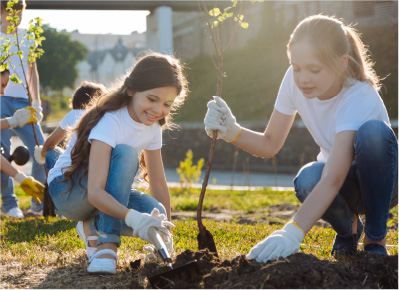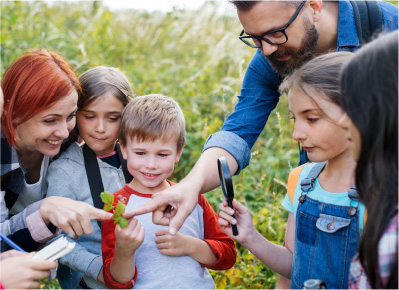How Community Gardens Empower Marginalized Youth: Cultivating Skills and Growth Through Urban Agriculture
Publish Date: July 4, 2025 0:00
Imagine a place where soil meets spirit—a humble community garden that is not only cultivating fresh produce, but also nurturing a new generation of confident, responsible, and resilient youth. In today’s fast-paced urban life, community gardening programs have emerged as powerful tools for youth empowerment and urban agriculture for youth. Marginalized youth, often left on the fringe, find purpose, skill development, and a sense of belonging in these green havens.
At Believe in Me, we’re all about empowering communities and giving youth the tools they need to bloom. Our initiatives align perfectly with the idea that active participation—from planting seeds to harvesting produce—instills responsibility and builds valuable life skills. Let’s dig into how community gardens are transforming lives, backed by real-world examples and research.
And if you’ve been scouring “People also ask” sections on Google, you might be wondering: What exactly makes community gardening so impactful? How do these spaces offer youth empowerment? And what role does urban agriculture for youth play in transforming communities? We’re here to answer all of that and more.
How Community Gardening Empowers Youth
The simple act of gardening can be revolutionary. For marginalized youth who might feel disconnected from conventional systems, community gardens create an environment where every seed planted is a symbol of hope and growth. By engaging with nature, these youths learn to nurture living things, developing practical skills and a sense of responsibility that translates to other areas of life.
Additionally, community gardening initiatives spark creativity and resiliency. Youth are encouraged to experiment, learn from small failures like a wilting plant, and celebrate successes when their hard work blossoms. Not only does this hands-on experience build technical skills in urban agriculture for youth, but it also fosters emotional and social strength.
Research from organizations such as the National Institute of Food and Agriculture (NIFA) and Edutopia confirms that engagement in practical, outdoor activities directly correlates with improved academic outcomes and enhanced interpersonal skills (NIFA, 2023; Edutopia, 2023).
Key Questions Answered
- What exactly are community gardens?
Community gardens are shared spaces where individuals come together to grow fruits, vegetables, flowers, and herbs. These gardens work as learning centers for sustainable living, community engagement, and healthy lifestyle choices. - How do community gardens empower marginalized youth?
They offer hands-on experience in urban agriculture for youth, building essential life skills, and providing mentorship while fostering personal growth and responsibility. - Are community gardens only about growing food?
Not at all. While food production is a key aspect, these spaces also promote teamwork, environmental stewardship, and community collaboration—vital components of youth empowerment. - How can community leaders support these initiatives?
By providing resources, volunteering, and collaborating with organizations like Believe in Me, community leaders can ensure that youth-led projects are well-funded and structured to succeed. - What role does urban agriculture for youth play?
Urban agriculture for youth transforms cityscapes by integrating green spaces into urban communities, offering vital education regarding nutrition, ecology, and sustainability.
Case Studies of Successful Youth Community Gardening Programs
Real change is best illustrated by tangible examples. Let’s take a closer look at two case studies where community gardens played a pivotal role in youth empowerment.
Case Study 1: Believe in Me’s Urban Green Initiative
Believe in Me has always been a trailblazer in creating opportunities for youth empowerment. Our Urban Green Initiative is a youth-led community gardening program designed to bring together at-risk youth for a shared purpose. In this initiative, marginalized youths participate by planning, planting, and managing their own garden plots.
One standout story is that of Marcus, a teen who discovered that his knack for gardening and knack for leadership blossomed side by side. Initially hesitant, Marcus soon became a mentor to his peers, learning that nurturing plants could also mean nurturing hope and resilience in himself and others. His journey from a participant to a community leader demonstrates the transformative power of urban agriculture for youth.
Marcus’s success is not isolated. Many participants in Believe in Me’s initiative have reported improved academic performance, enhanced social interactions, and a newfound appreciation for the environment—all thanks to their time in the garden.
Case Study 2: Evergreen Youth Garden Project
The Evergreen Youth Garden Project is another stellar example—a nonprofit endeavor that leverages community gardening to empower marginalized youth. Located in an urban neighborhood, this project transforms vacant lots into vibrant garden spaces. Youth involved in the project learn about sustainable agricultural practices and are actively involved in every stage of the garden’s development.
Sarah, one of the lead participants, credits the project for not only teaching her practical gardening skills but also instilling in her a profound sense of purpose. “I never imagined that digging in the dirt could change my life,” she shares. The project emphasizes accountability, environmental education, and community collaboration, forming a grassroots model that is now being replicated in several other cities.
The Role of Community Gardens in Building Resilient Communities
Beyond individual growth, community gardens create environments that bring entire neighborhoods together. These gardens serve as safe public spaces where diverse groups can share knowledge and work towards a common goal. For community leaders, educators, and nonprofit organizers, community gardening offers an opportunity to break down silos and foster a spirit of mutual respect and collaboration.
Urban agriculture for youth not only provides direct benefits such as improved nutrition and reduced environmental stressors, but also promotes collective responsibility. When residents work side by side, the resulting social cohesion can lead to decreased rates of crime, better community health, and stronger local economies. Initiatives like those at Believe in Me are testament to what can be achieved when community gardens become incubators for positive change.
Moreover, the warmth of a shared garden stands in contrast to the often cold and isolating urban settings, reinforcing the idea that nurturing nature can heal societal divisions. It is the collective effort that transforms barren lots into thriving communities—a metaphor for unity and strength.
Actionable Ways to Get Involved
So, how can you—community leader, educator, or nonprofit organizer—contribute to this green revolution and help empower marginalized youth through community gardening? Here are some actionable steps to start making a difference:
- Volunteer Your Expertise: Share your gardening skills or organizational know-how with youth programs. Whether you have a green thumb or administrative expertise, your involvement can nurture confidence and competence in young participants.
- Host Workshops: Collaborate with local organizations like Believe in Me to host community gardening workshops that teach urban agriculture techniques and sustainable practices.
- Support Funding Initiatives: Consider donating funds or supplies to community gardening projects that are working to empower youth. Every contribution, no matter how small, helps cultivate growth.
- Advocate for Urban Agriculture Policies: Use your voice to promote policies that support urban farming and community gardening initiatives in schools and community centers.
- Participate in Youth-Led Projects: Join ongoing programs like Believe in Me’s Urban Green Initiative and contribute directly to the planning and execution of community gardens.
Each volunteer hour, every workshop, and all forms of support add up to a safer, more cohesive community where marginalized youth can thrive. Your involvement is not only an investment in a garden—it’s an investment in futures.
Conclusion: Planting the Seeds for a Brighter Future
Community gardens are more than just plots of land; they are transformative spaces that empower marginalized youth through the practice of urban agriculture for youth. By joining hands with programs like Believe in Me’s initiatives, communities can cultivate responsibility, skill-building, and a true sense of belonging among participants.
The success stories of Marcus from the Urban Green Initiative and Sarah from the Evergreen Youth Garden Project remind us that even in the midst of urban challenges, hope can sprout. When we nurture the potential of youth, we invest in a future that is both sustainable and inclusive.
Community leaders, educators, and nonprofit organizers—now is the time to roll up your sleeves and get involved. Help recruit 15 new participants for a youth-led community gardening program within the next three months and watch how a shared vision can transform communities one garden at a time.
Let’s reimagine urban spaces together—where every seed sown is a step toward a brighter, greener, and more empowered future.
Citations: National Institute of Food and Agriculture. 2023. https://www.nifa.usda.gov/; Edutopia. 2023. https://www.edutopia.org/.
Get to know more about Believe in Me and Help a Kid Today
References
National Institute of Food and Agriculture. 2023. https://www.nifa.usda.gov/; Edutopia. 2023. https://www.edutopia.org/.






